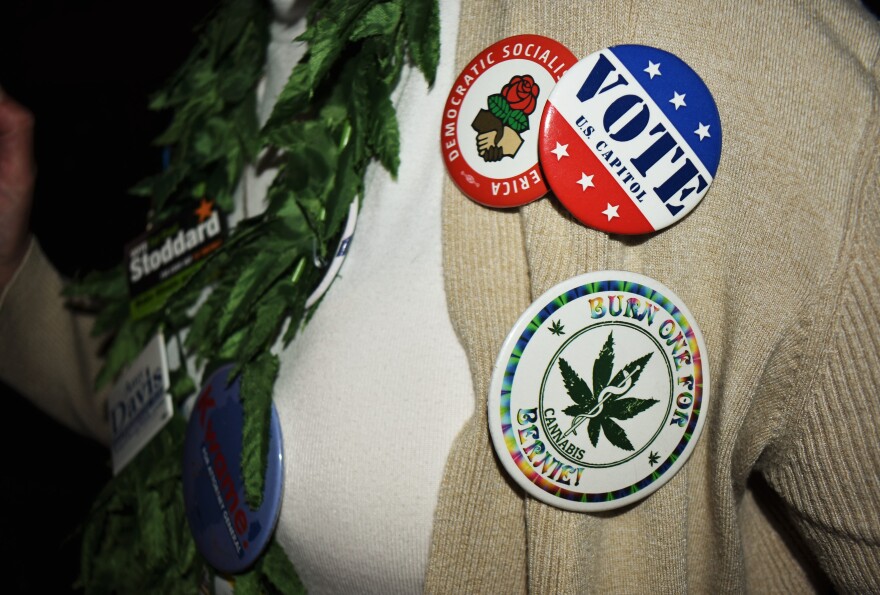Canada recently became the largest country in the world to legalize recreational marijuana. Lines of customers looking to buy government regulated cannabis stretched for blocks. Clive Moore is a student at Concordia University in Montreal. He says he didn't expect the law to become a reality.
"It seems, ridiculous, it's just one of those things we just asked the government for repeatedly, and eventually they each caved in and gave it to us," said Moore.
Rescheduling. Decriminalization. Medical use. Recreational. Home grown. These terms are in the spotlight not only in Canada. Some northern Illinois political candidates came together this week to talk about what it would mean to pass a recreational marijuana law in the state.
It was called the first annual "Cannabash" and included hopefuls for the DeKalb County Board to Congress.
"When it becomes recreational, and if you decide to recreate with it every day, keep an eye on it. So I guess that's my time -- thank you," said Amy Davis, candidate for State Representative in the 90th District. She said she's a cannabis user herself.
"I have degenerative disc disease in my thoracic spine and I've had it since the mid '90s, but I didn't know what it was, and I treated it alternatively because I didn't want to go to medical doctors," she said.
Davis says cannabis could be an alternative to pharmaceuticals, if used with caution.
"I have some issues that I think sometimes it's how things are produced. And we don't know how things are produced, how the edibles are produced, how things are produced. And perhaps I was using too much of it because we don't have research, you know, we don't have a lot of those guidelines," said Davis.
Earlier this year, an outbreak of what the Department of Public Health called synthetic cannabinoids, or fake weed, killed four people in central Illinois. So far, no deaths have been reported anywhere in the world from ingesting too much pure marijuana. Davis said more research is needed to understand how pot could be a medicine, and legalization will help bring that knowledge to the public.
Davis is running against Republican state Representative Tom Demmer who voted against a 2013 measure to legalize medical marijuana in the state.
Legalization isn't a new debate. Anita Bedell is a seasoned contributor to the discussion statewide. She's the executive director of Illinois Church Action on Alcohol and Addiction Problems. She says the group has been working for a decade to inform people about the dangers of marijuana.
"When we first started, most legislators were opposed to marijuana legalization. And we've seen the sway the other way where now legislators who were opposed are now supporting, and that's very surprising because some are saying that they're doing it for the revenue," said Bedell.
Bedell said the money generated by a cannabis market wouldn't be large enough when considering the costs to the state. She said adding another drug to the market would only increase costs for things like increased traffic safety measures and funding for addiction services.
"I think legislators who are supporting it aren't sufficiently looking at the cost versus the revenue," she said.
Eight U.S. states now have some type of recreational use law in place. All of that legislation passed in the last six years. Illinois is in a pilot phase of a medical marijuana law until summer 2020. Bedell said the real work will come next year.
"It hasn't been a lot of open talk in the legislature," said Bedell.
Some say a vote on cannabis brings young people to the polls. There's a group at Northern Illinois University called Model Illinois Government that says this could be a reality. The group holds simulated debates on real Illinois legislation from both parties. This week's debate? Senate Bill 2275 – a referendum that would bring pot to the ballot in November.
Students Paige Leonard and Layla Werner argued opposing sides of the debate.
Leonard says she definitely thinks young people would want an opportunity to vote on this issue.
"And I know with older people it's a Democratic–Republican thing, it's either yes or no. But I think with young people, it doesn't matter if you're a Democrat or a Republican, they just want it legalized," said Leonard.
Werner agrees. She says the main argument against legalization is that the plant could be a gateway drug.
"There are some other arguments that you can make against it but I believe that by legalizing it, it's something that the FDA will have to also approve. So then there will be more studies and more research that can be put into this drug that will make it ultimately safer," said Werner.
As of right now, you won't see a vote on recreational marijuana use on your ballot. But all eyes are on Canada to see how this new market plays out nationwide.




